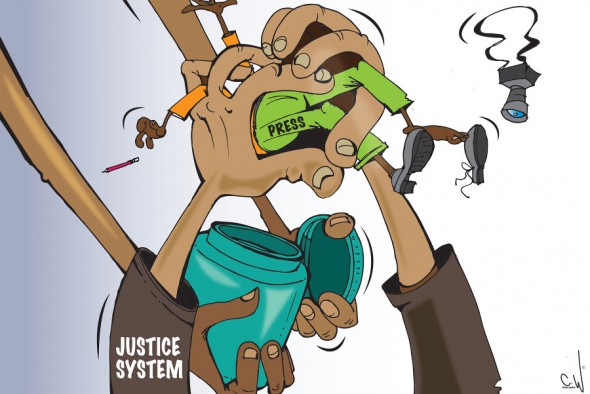Written by Priscilla J. Quiah and reviewed by Windsor Smith

ATTACKS ON THE PRESS, starting as a simple typewritten list over 25 years ago, is now considered the world’s most comprehensive guide to international press freedom, providing analysis of media conditions, press freedom violations, and emerging threats to journalists in every corner of the world.
It was interesting for me as I read titled, “Pressure on Journalists Rises Along With Africa’s Prospects,” by Mohamed Keita, an advocacy coordinator for CPJ’s Africa Program, from CPJ’s 2014 Edition of its BOOK, seeing a complete reflection of the Liberian media landscape and the government.
In his piece, Keita tried to chronicle how most African Leaders pressure journalists to shape news coverage in the name of patriotism and unity, promoting the story of economic development and whatever is pleasing at the moment in the corridors of power over stories democracy and human rights.
The book explored how media restrictions are justified by invoking the primacy of economic development, yet research from various independent groups have found out widening inequality, endemic corruption, and bad governance which cripple the pace of development and maintained the continent’s dependence on aid, thus the case of journalism reflecting reality.
“We must be loyal to the system and the government of the day,” – Criminal Investigation Department Director of Nairobi, Kenya, Ndegwa Muhoro said in the book.
This brings me to why I had earlier said; Keita’s piece was a reflection of Freedom of the Press situation in Liberia. And of course you must know that Liberia is in Africa.
As a matter of fact, Liberian President Ellen Johnson
Sirleaf received the 2011 Nobel Peace Prize for her
commitment to and furtherance of the democratic process.
In July 2012, President Sirleaf became the second African
head of state to endorse the Declaration of Table Mountain,
which calls for the repeal of criminal defamation and
‘insult’ laws throughout Africa. Moreover,
Article 21 of Liberia’s Constitution states that
“excessive bail shall not be required, nor excessive
fines imposed, nor excessive punishment inflicted”.
However, more than a year later, Liberia has yet to comply with this commitment.
Main while, in recent years, Liberian government officials have filed several libel lawsuits against local newspapers, seeking damage awards at least as high as US$5 million. These are incredible sums in a country that ranks toward the very bottom of the World Bank’s development indicators. The newspapers sued for these astronomical amounts include the Analyst, the Independent, and the New Broom. The New Democrat also lost a large libel lawsuit brought by a company that the newspaper alleged misused public funds. FrontPage Africa Editor-in-Chief was jailed and the newspaper ordered closed by the Supreme Court of Liberia, on August 21, 2013, following the newspaper’s inability to pay 1.5 million United States dollars towards libel damages. Recently radio talkshow host Henri Costa was arrested on February 7, 2015, based on a complaint filed against him by a son of President Ellen Johnson Sirleaf. President Sirleaf’s son, Fumba Sirleaf, is also the National Security Agency Director.
Mr. Costa was reported to have been canned at the Monrovia Central Prison pending the start of preliminary hearing into the Complaint by the National Security Agency Director on February 10, 2015.
In November 2013, the Press Union of Liberia presented a draft bill to the Liberian Legislature to abolish criminal defamation laws of Liberia; the Legislature has yet to act.
In 2013, the Human Rights Watch, Amnesty International, Global Witness had written President Sirleaf in these words, “ We write today to express our concerns about Liberia’s libel law, which fail to meet international standards on freedom of expression and the media. They allow excessive judgments and undermine the right to appeal, which has been evident in the recent case and imprisonment of Mr. Rodney Sieh.
The Human Rights Watch Group was amongst several other leading Press freedom organizations, including: Syracuse University, Newhouse School, Alexia foundation, Committee To Protect Journalists, Reporters Without Borders, New Narratives, Tully Center For Free Speech – S1 NewHouse school of Public Communications and the National Civil Society Council of Liberia, working with international Lawyers advocating for the release of the Journalist. Despite statements of support from these global democratic institutions, Sieh was returned to prison on September 18, 2013, from hospital where he was taken on August 28, 2013, due to poor health he developed in prison.
Being unable to pay the fine of US $ 1.5 m in libel damages and US $ 900, 000 as court costs, an amount, which was said to be 30 times the newspaper’s annual operating budget, the Supreme Court verdict was seen as a life imprisonment sentence of Sieh.
His case was related to the publication of two articles in FrontPage Africa, which cited among other sources, results of investigations into the Agriculture Ministry’s accounts led by the General Auditing Commission, Liberia’s independent corruption watchdog, and found Agriculture Minister Chris Toe liable of wrongdoing and recommended his prosecution. Minister Toe was not in fact pursued through the courts, although he did resign from his post, allegedly as a result of pressure from the president. He however denied the allegations against him and claimed that FrontPage Africa’s articles were libelous because he was never prosecuted or convicted. FrontPage Africa requested but was denied a retrial, despite reports that members of the jury had been bribed. According to Sieh’s lawyer, Samuel Kofi Woods, the trial was marred by a number of other irregularities, including links between one Supreme Court justice and the law firm-representing Toe.
Currently, the Liberian Penal Code imposes criminal
penalties for ‘criminal libel against the
President’ (section 11.11), ‘sedition’
(11.12) and ‘criminal malevolence’ (11.14).
Rodney Sieh, ‘Jailed for Journalism’, New
York Times (30 August 2013)
Lucianan Storelli-Castro, ‘The Liberian Media:
President Johnson Sirleaf’s New Public Enemy Number
One’, Think Africa Press (6 September 2013)
Free Rodney Sieh Campaign page
Change.org Petition
